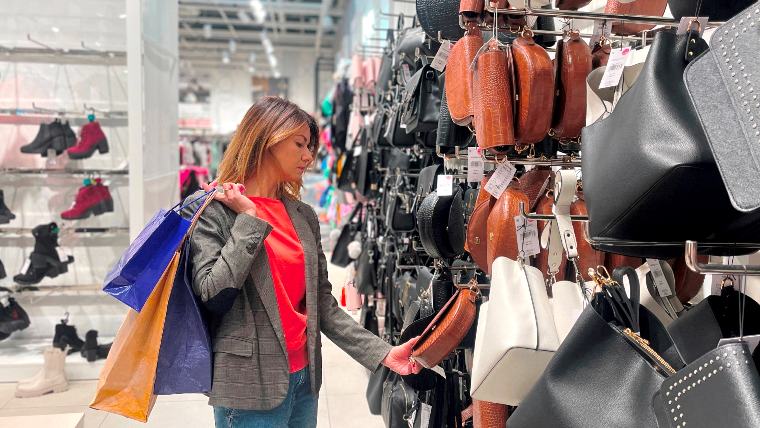Signs of a Shopping Addiction

We've all spent more than we meant to from time to time. And we've all got a laundry list of purchases we regret.
But for many people, sprees and splurges aren’t just occasional mistakes: they’re signs of a very real problem with shopping.
Compulsive shopping is similar to most other addictions in that shopping causes the release of endorphins and dopamine in the brain. Essentially, the addiction is not to the behavior, but to the feeling the behavior gives you.
That addiction can manifest in a number of ways. If you feel that any of the following signs describe your behavior, please consider seeking professional assistance. The best course of action to deal with any addiction is to speak with a qualified therapist.
Shopping makes you feel better
Compulsive shoppers often turn to shopping during periods of sadness, anxiety, or depression. Due to the nature of addiction, it’s even possible that those periods of low feeling are actually caused by shopping (specifically the lack of shopping).
As in most scenarios, a single instance of shopping to relieve negative feelings isn’t necessarily indicative of a shopping problem. However, if you are consistently shopping to improve your mood, you may be suffering from a shopping addiction.
Shopping creates a cycle of guilt and relief
Taking things a step further, if you recognize that you are shopping too much, that may cause you to feel guilty or anxious. In order to escape those feelings of guilt and anxiety, you shop again, which provides temporary relief, but later leads to even greater feelings of despair.
This sort of cycle can be incredibly destructive. Guilt leads to anxiety. Anxiety leads to shopping. Shopping leads to guilt. On and on, and all the while finances are getting strained further and further.
You hide part or all of your shopping from others
There are some circumstances where it makes sense to hide the things you bought, like Christmas gifts or birthday presents. You're also entitled to a certain amount of privacy, and by no means are you required to let the world know what you've been spending your money on.
But if you find yourself regularly hiding purchases from your spouse or other loved ones, that may be a sign of addiction. Downplaying how much was spent or what was purchased usually means that you recognize you’ve made purchases that are potentially damaging. It’s a sign that you know you shouldn’t be buying the things you’re buying, but can’t help yourself.
You shop despite the damage it causes to your relationships
Has your family or partner expressed concern about your shopping? Does your spending cause arguments?
Whether you think these rifts are fair or justified, if your shopping is causing problems in your relationships, that’s a clear sign that your spending has become destructive. If you're not willing to listen to the concerns of your loved ones, or refuse to engage with the problem, things will likely only get worse.
You buy things you never use
If you’re buying items that you never use – and never really intend to use – then you know that you’re shopping for the sake of shopping. The purchases are irrelevant, because your addiction is to the process of shopping, not the actual items you’re purchasing.
Making a few regrettable purchases is normal, but if your closet is filling up with unopened boxes, that’s a sign of a real problem.
Buying and returning and buying and returning
Some shopping disorders function similarly to eating disorders, where those afflicted go on an expensive shopping binge, then effectively purge by returning everything they bought.
Financially, things might even out this way, but it’s still a sign of an unhealthy relationship with shopping.
You buy one in every color
For some people, compulsive shopping manifests as an intense need to create complete sets. These “collectors” are driven to buy every item in a set or every variation of an item. Collecting can be a perfectly harmless hobby, but when it becomes a compulsion it can create an enormous amount of financial and psychological distress.
The key distinction is your financial capacity: what are you losing by investing so much in these collections? If you can afford every color and permutation of the most popular beverage container on TikTok without putting the rest of your household budget in danger, go for it. But if your obsession is making it difficult to manage other bills and expenses, that's a sign of a problem.
You're worried you're losing control
Ultimately, the most immediate and telling sign that you may be dealing with an addiction is that you don’t feel in control of your shopping. You want to stop, but you can’t. You know it’s a problem, but you can’t seem to do anything about it.
There are few feelings worse than feeling like we don't have control over own lives, but the worst thing you can do is let fear and shame prevent you from getting the help you need.
If your shopping habits feel like a problem, then there’s a very good chance they are. If you think you may be dealing with an addiction to shopping, please speak with a qualified therapist.
And if you need help dealing with the financial fallout of overspending, we can help. We offer free financial counseling, 24/7, online and over the phone. We also offer incredibly effective debt repayment tools to help you get your finances back on track.

















